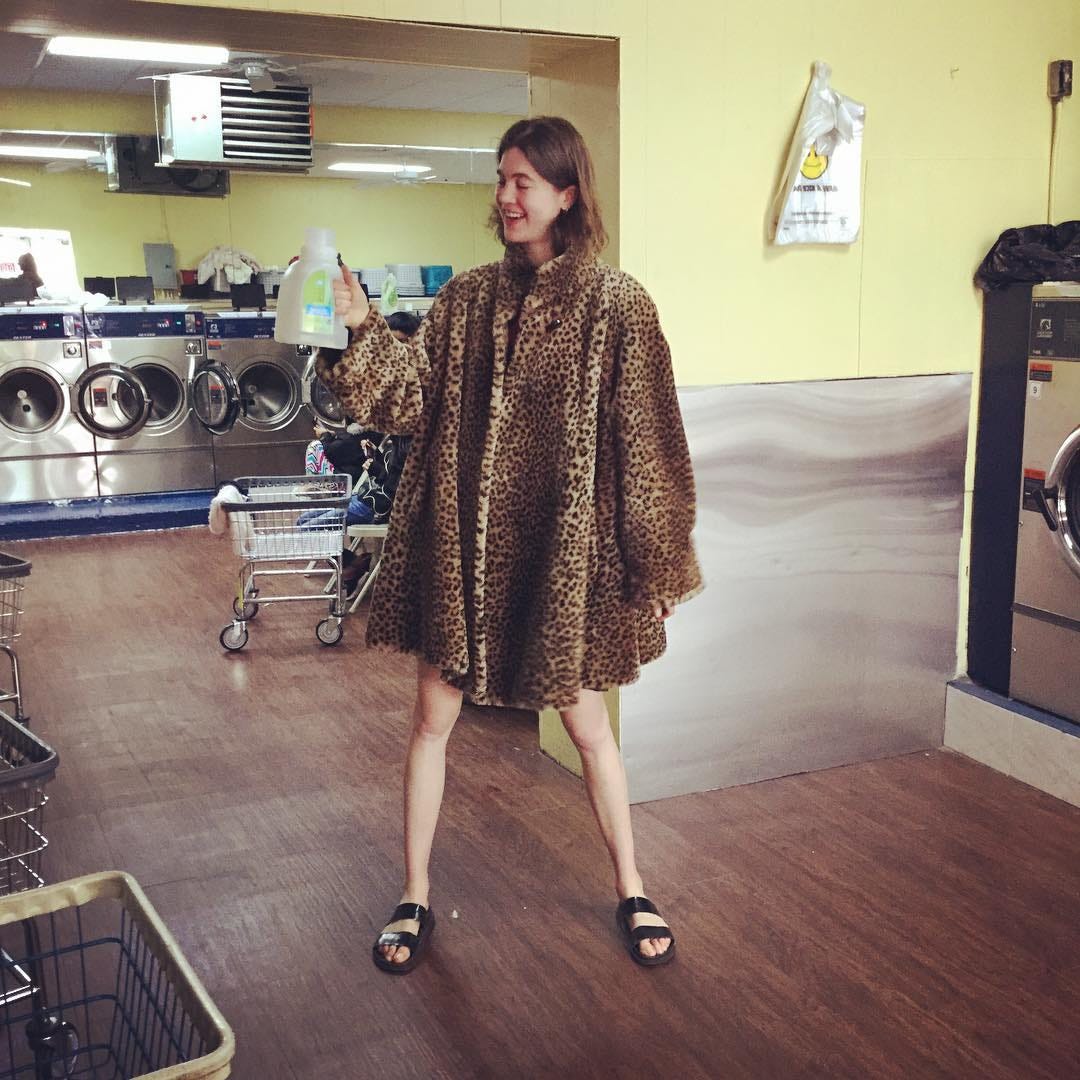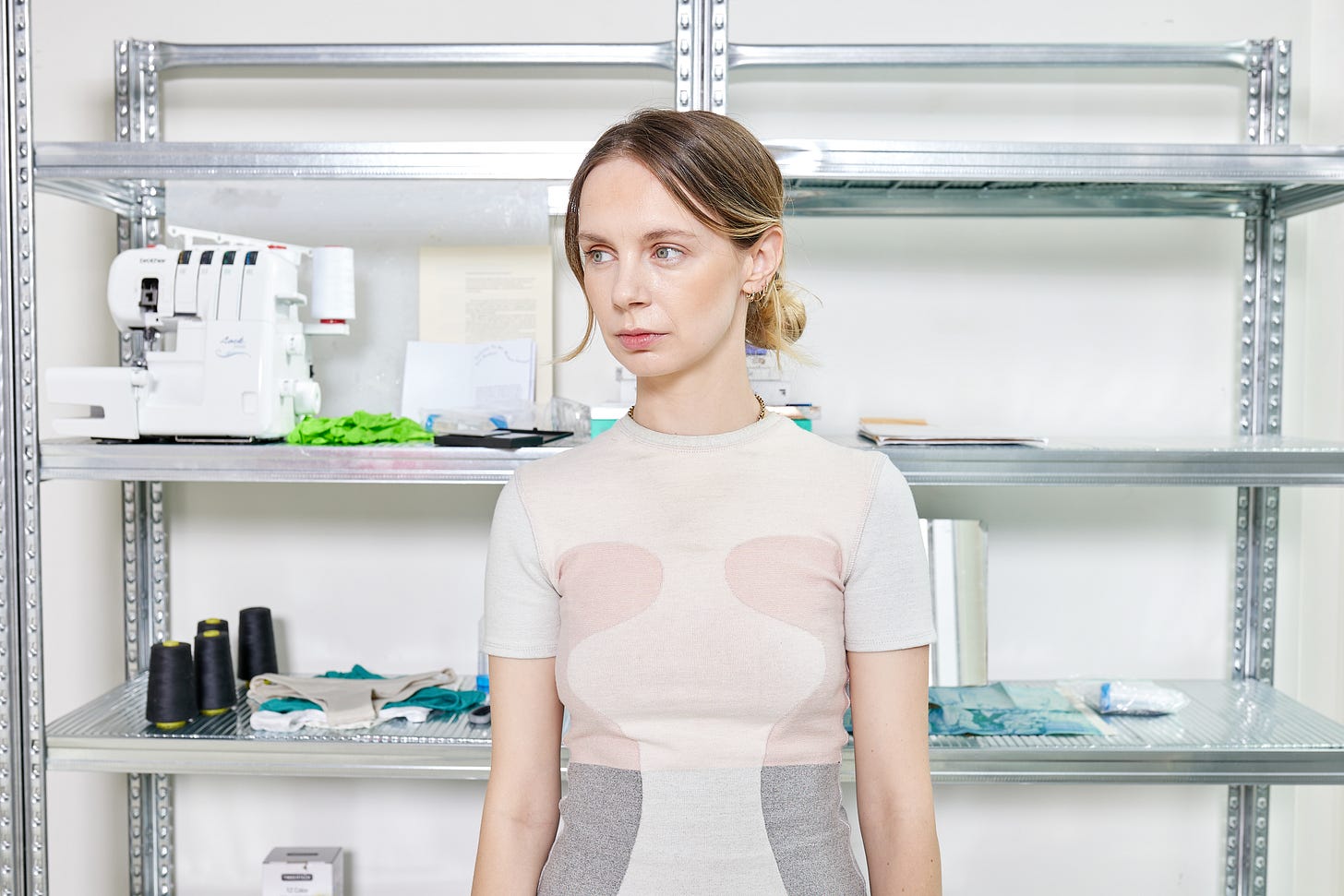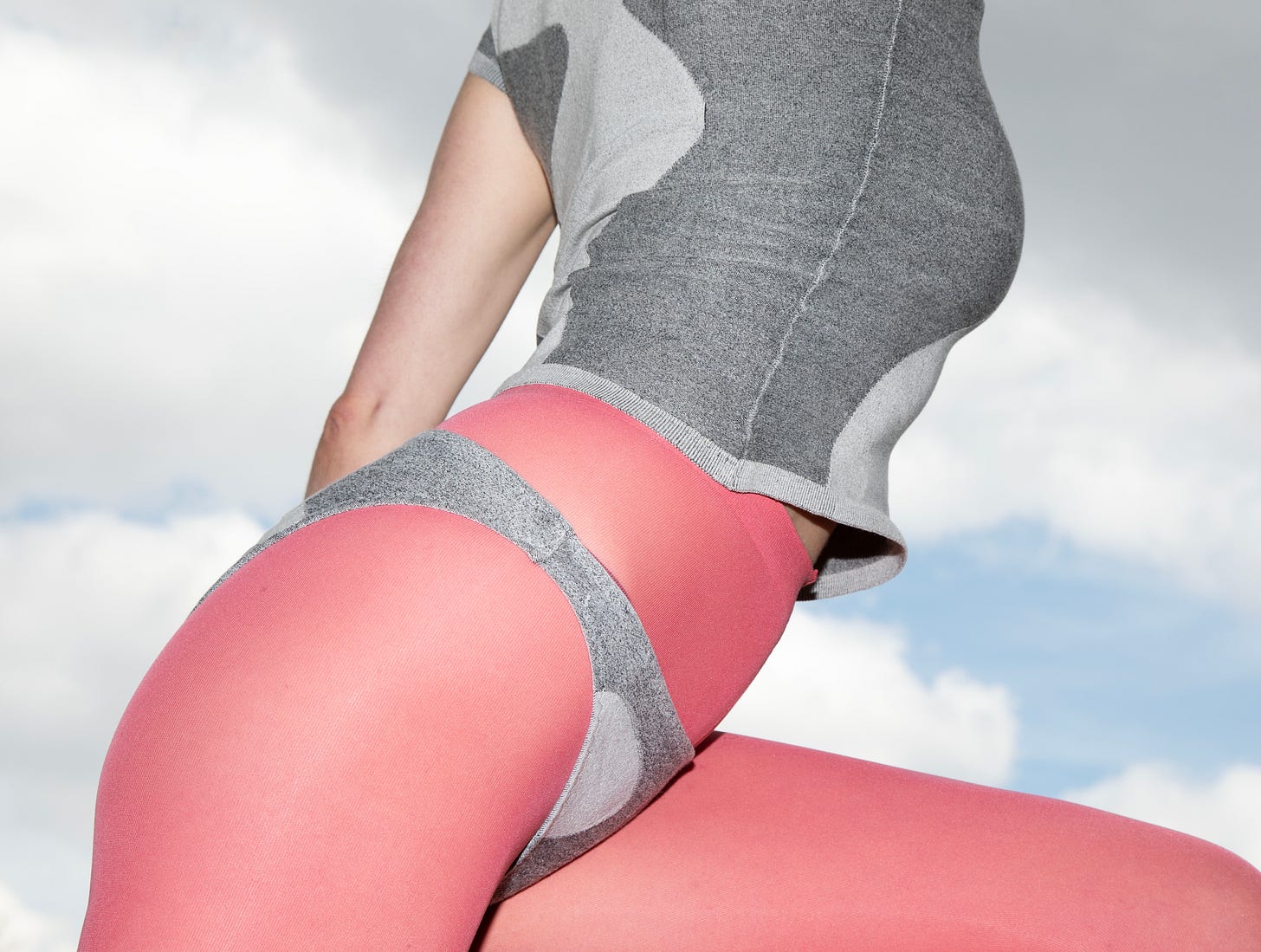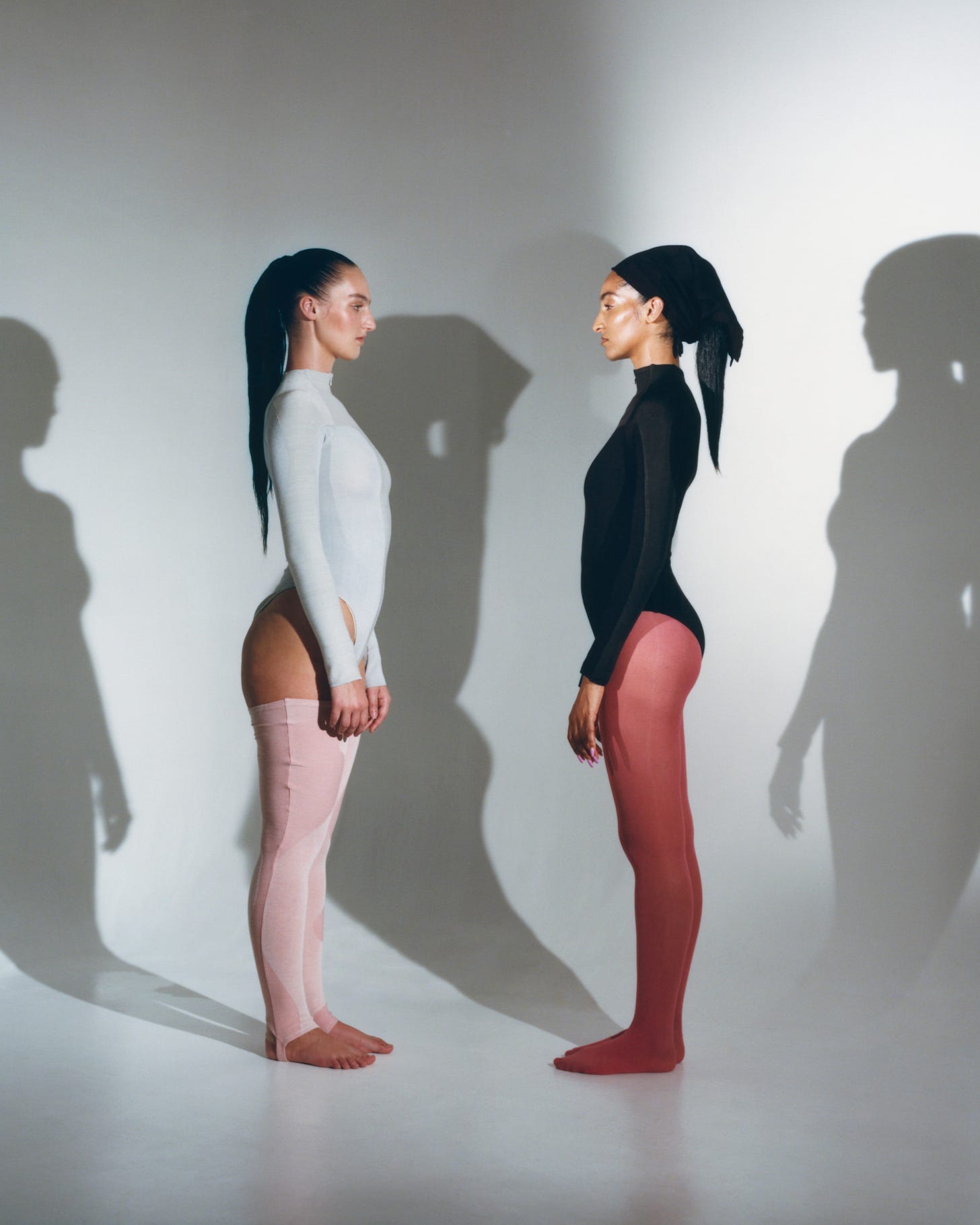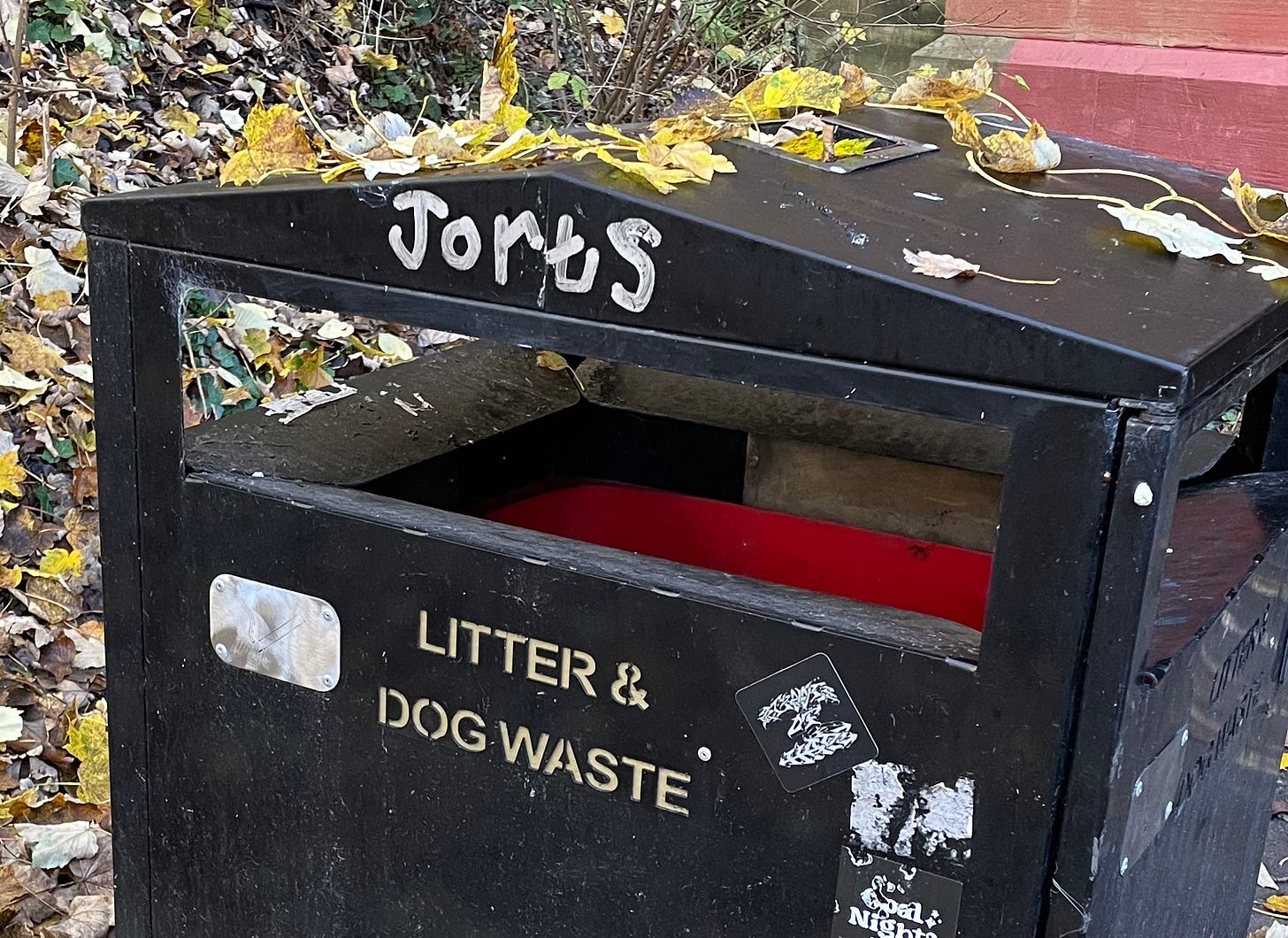A Thread about taking probiotics via your clothes
Meet designer and textile scientist Rosie Broadhead.
In my last newsletter, NYC-based fashion journalist Emilia Petrarca said she’d like to know more about how people do their laundry.
Well Emilia, when I lived in New York, laundry day involved bundling downstairs to the laundromat across the road, where I’d shove a week’s worth of grubby garments into a machine, inserting a stream of quarters and returning 45 minutes later to transfer the soggy blob into a dryer. More quarters, another 45-minute wait and finally my warm knot of clothes would be ready to take home. The whites would be a shade greyer, the darks a shade lighter. Over time, many items acquired a light dusting of bobbles - the laundromat patina, aka. memories of the whirring inferno where fabrics go to die.
These days in London, I’ve got the luxury of an in-house washer, but I still spend a lot of time peeling apart wet socks and wrestling with dripping sheets. After all, laundry is modern life’s Sisyphean task, a never-ending cycle of rinse and repeat.
I’m taking a while to get to my point (hope you’re enjoying the scenic route) but this week, I interviewed someone who might be changing all that. No, this newsletter is not about laundry. Instead it’s about the infinitely more interesting Rosie Broadhead, a designer who’s developing new fabrics that self-sanitise, as well as creating textiles that can heal skin conditions whilst you wear them.
I first encountered Rosie’s work when I visited my friend Marie Lueder’s studio, where Marie showed me an algae-encapsulated knit they’d collaborated on. The piece originated from Rosie’s SKIN SERIES project, where she develops textiles that contain natural ingredients to soothe and nourish the skin. Now she’s working on a new probiotic treatment for sportswear as an alternative to antibacterial finishes (and yes, that means less laundry). I got her on the line to learn more about her pioneering work.
As always, don’t forget to catch up on the podcast and subscribe for more Threads of Conversation.
Rosie: Are you in London right now?
Georgia: Yeah, I’m in my little anti-seasonal depression chamber ie. my study, where I have this big orange light.
Rosie: Does it work?
Georgia: Kind of. I feel like it gives me a vibe when I’m on video calls, because I look like I’m in a James Turrell art piece or something.
Rosie: I’m in this office space in Ghent right now. It’s very sterile-looking, quite lab-like. Which I guess is fitting!
Georgia: Can you tell me about what you’re doing there?
Rosie: I’m a designer. My background is in research and development in sportswear. I have a company, SKIN SERIES - I call it a therapeutic textile company. SKIN SERIES focuses on how we can improve our skin health or our relationship with clothing through what we’re wearing.
Alongside that I'm also researching probiotic textiles, which are an alternative to the antibacterial finishes you normally find in sportswear. So basically adding healthy bacteria into textiles to try to improve your odour.
Georgia: Do you consider your work to be futuristic?
Rosie: With SKIN SERIES, it was a bit of play on futurism, but also kind of like this dated future, because a lot of its sci-fi aesthetic comes from the 70s, and that isn’t the future anymore. Bacteria are also something that have existed in in the world and on humans for centuries. We’re not really creating a future, we’re actually looking at the past and bringing that into the present.
Georgia: That’s a nice allegory for circularity.
Rosie: I did a lot of research on the body and the kind of bacteria that are already existing on our body, or ingredients which already exist in nature. My biggest focus at the moment is on probiotic finishes. That’s basically encouraging the growth of pre-existing good bacteria on your body, so when you’re wearing a probiotic garment, these bacteria become more active on your skin.
Georgia: So what you’re working on is a probiotic finish, not an antibacterial finish?
Rosie: Exactly, yes. We’re trying to avoid antibacterial finishes, as these kill everything on your skin. Instead we’re promoting the growth of healthy bacteria on your skin, so it works in the opposite way.
Georgia: If you wash these probiotic garments, does that then kill the bacteria?
Rosie: No, you can wash them. Although we’re trying to make you think about how often you need to wash your clothing, because it's not always necessary, and it has a detrimental effect on your clothes and the environment. Laundry uses a lot of energy, and microplastics are being washed into our water systems. However it’s still very much ingrained into society that this is something we have to do every time we wear a garment.
Georgia: And do the probiotic fabrics have the same benefits as your algae encapsulated pieces that you made for SKIN SERIES, which had healing properties?
Rosie: Yeah, so the bacteria that we’re working with can also have a healthy effect on your skin, the same way that algae does. It can be antioxidant, and promote cell regeneration. It could also be preventative for someone who suffers from eczema or psoriasis. We don’t say that it’s going to cure your eczema, because that would be a medical product.
I think there has been a lot of focus on bioactives, especially in skincare, but less so in fashion and clothing, something that’s next to our skin all the time.
Georgia: Would you ever see a point at which this technology is developed so that your beauty products are encapsulated within your clothing? So instead of applying a moisturiser, you might have your moisturiser encapsulated in your clothes?
Rosie: Yes - what you’re wearing next to your body also has the same potential effect on your skin as your everyday skincare regime. If anything moreso, because you’re always in contact with textiles.
Georgia: I guess we’re used to taking probiotics internally, but I’d never thought of using them topically.
Rosie: People really understand taking probiotics internally and what that means, but it’s the same thing topically on your skin. I saw a project many years ago that kind of inspired me to go down this route. It was basically a bra where you could add the medication you’d take if you were susceptible to breast cancer. This medication comes with a lot of side effects if it’s taken orally, but this designer/doctor was looking at how you could design a bra to take this medication transdermally. That blew my mind. How clothing could also become a vehicle for healing the body internally, and on the surface of the skin.
Georgia: Your work feels like it’s at the intersection of fashion, beauty and wellness. Do you see these industries becoming more integrated in the future?
Rosie: Yes I do. I think when you realise that textiles can have an effect on your skin condition and that skin is a porous membrane, it seems obvious.
Georgia: With Gorpcore and the growing sportswear trend in fashion, what do you think is driving this enthusiasm for performance-based clothing?
Rosie: I think people really like the idea that their clothing is more than just fashion; it’s providing some kind of protective layer. I guess the problem with that is that it is really focused on the kind of chemicals that I’m trying to actively de-promote. Like waterproof finishes, which are very toxic to the body. Some of these garments have performance properties for someone who’s going on a multi-day hike, but people are wearing them to the shops. Sometimes you don’t need that level of performance. I’m trying to promote the idea that our bodies are sometimes enough, you know?
Georgia: Your SKIN SERIES garments are very beautiful, and very on-trend at the moment. Was that something that you were thinking about when you were designing, or more of a happy accident that the bodycon trend returned around the same time?
Rosie: It was deliberate because I do see the importance of making science desirable. I think if you make something beautiful that people would like to wear, you can get a bigger audience on board with it than if you perhaps put a scientific paper out and only 10 people read it. It’s a different way of communicating. Design and fashion provide this opportunity to rethink the materials around us that interact with our bodies. It becomes more personal and has the power to change minds or inspire.
Georgia: Lastly, can you tell me about the exhibition you created, ‘Surface Tension’?
Rosie: It's a cross-disciplinary online exhibition I did with Wilson Oryema. It’s thinking about what already exists, because there's a lot of focus on new innovation in sustainability, but there are a lot of existing materials and solutions already out there. I was really interested in this MCP glove, which is a glove that compresses your body to maintain cardiovascular function, for when you're going into space. Initially it was something that was showcased a lot in sci-fi movies but no one had ever actually made it. But there’s this team in Brooklyn that are making these suits a reality.
Georgia: What are you exploring next?
Rosie: I’m working on a new research project on hormones. Hormonal changes throughout a woman’s life can cause health issues, and there are knowledge gaps due to underfunded women’s health-related research. This means limited therapeutic and medical solutions. You often read that synthetic materials can be endocrine-disrupting - that means the chemicals can alter your hormones in a negative way. But I was like, what if we can alter the endocrine system in a positive way? I like the idea of health, especially women’s health, being more open-source and personal, rather than part of a system.
Threads of the week
Speaking of laundry, here’s an outfit that’s waiting for a spill. Wearing some Dickies dupes I bought on Depop with an old Japan football jersey and my Cecilie Bahnsen Asics sneakers. The belt is custom BFG merch, given to me by a dear friend.
Loose Threads
I had a lot of thoughts on Phoebe Philo’s debut.
I’m really looking forward to reading this book. And this one and this one.
Did you know that the photographer William Eggleston made music? Me neither. Well, he just released a new album.
Lastly, some strong feelings about jorts in Glasgow:
Start your own Thread
Add your thoughts in the comments, and let me know which Threads of Conversation you want to hear about next!
Subscribe to Threads of Conversation. Unravelling the stories we tell through style via interviews, podcasts, essays and more.


